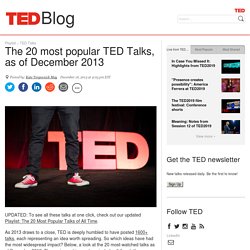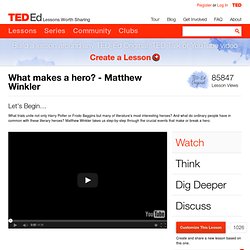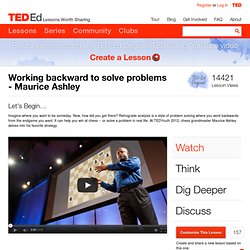

The Power of Belief - Mindset and Success- Growth mindset vs Fixed mindset. The most popular 20 TED Talks, as of now. UPDATED: To see all these talks at one click, check out our updated Playlist: The 20 Most Popular Talks of All Time.

As 2013 draws to a close, TED is deeply humbled to have posted 1600+ talks, each representing an idea worth spreading. So which ideas have had the most widespread impact? Below, a look at the 20 most-watched talks as of December 2013. These viewership numbers include all the platforms we track: TED.com, YouTube, iTunes, embed and download, Hulu and more. Some fascinating things to notice on this list, if you’d like to compare and contrast it to the most popular talks in 2012, and to the list we shared back in 2011: Amy Cuddy, Susan Cain, David Blaine and Pamela Meyer are all newcomers to the list, with Cuddy’s talk storming to spot #5 thanks to you sharing it.
But what really makes this list so incredible is the fact that it spans so many areas of interest, from education to happiness, statistics to creativity, tech demos to illusions. What makes a hero? - Matthew Winkler. The Hero Archetype in Literature, Religion, and Popular Culture: (along with a useful PowerPoint presentation teachers can download at this URL: ) Maricopa Center for Learning and Instruction (users embark on their own hero's journey): An American Masters Lesson from PBS for Teachers on George Lucas, the Power of Myth, and the Hero's Journey: And an interactive approach to the Hero's Journey: And of course, information about Joseph Campbell's works on the subject, on the Joseph Campbell Foundation site: The Hero With A Thousand Faces The Hero's Journey (semi-biographical film): Compare the stories of (a) Odin hanging from the world tree, Yggdrasil, (b) the Buddha seated under the Bodhi Tree, and (c) the crucifixion of Jesus Christ.

Challenge the paradigm. Bill Moyers interviews Joseph Campbell Video featuring respected screenwriter Chris Vogler's interpretation of Campbell's work New Mexico State University iTunesU course on Mythology. Working backward to solve problems - Maurice Ashley. See Maurice Ashley's blog here.

He's the international chess grandmaster, and his motto is, "Your passion is your window to the world. " In chess, retrograde analysis is a computational method used to solve game positions for optimal play by working backward from known outcomes (e.g. checkmate), such as the construction of endgame tablebases. In game theory at large, this method is called backward induction. For most games, retrograde analysis is only feasible in late game situations of reduced complexity, such as a chess position where few pieces remain in play. Here is a list of requirements (the whole handbook, actually) for a chess grandmaster. What makes a hero? - Matthew Winkler. Dan Pink: The puzzle of motivation. Amy Cuddy: Your body language shapes who you are.
TEDxAthens - Kostas Grammatis - A Human Right. Emily Pilloton: Teaching design for change. Salman Khan: Let's use video to reinvent education. Video.ted.com/talk/podcast/2012S/None/VinayVenkatraman_2012S.mp4. Jane McGonigal: Gaming can make a better world. TEDxPortsmouth - Dr. Alan Watkins - Being Brilliant Every Single Day (Part 1) Why we procrastinate by Vik Nithy @ TEDxYouth@TheScotsCollege. Brené Brown: Listening to shame. Shawn Achor: The happy secret to better work.
Jane McGonigal: The game that can give you 10 extra years of life. Derek Sivers: Keep your goals to yourself. Matt Cutts: Try something new for 30 days. Seth Godin: Sliced bread and other marketing delights.